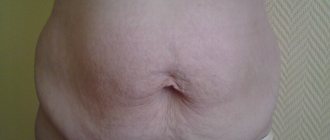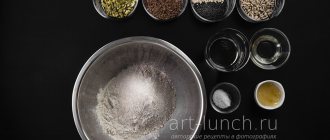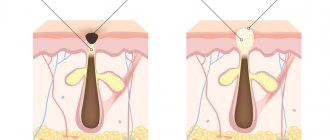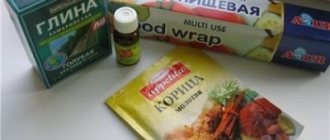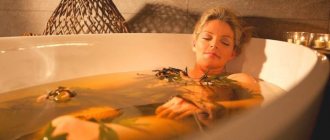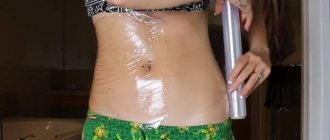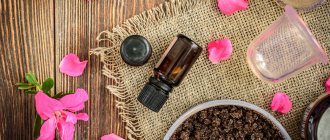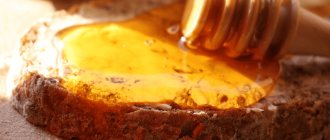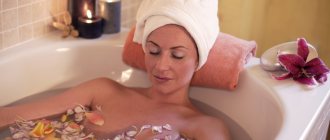Why does foot odor occur?
Natural causes
The basis of the smell is the work of the sweat glands, which are located on the surface of the skin of the feet in large numbers and perform the most important function - thermoregulation.
During periods of increased outdoor temperature, when wearing warm shoes and socks, and with increased physical activity, the sweat glands begin to work more intensely, and the odor becomes more pronounced. Up to 200 ml of sweat can be produced per day.
The fluid produced by the sweat glands, i.e. sweat has no odor because it consists of 99% water, and only 1% consists of various salts, acids, chlorine and ammonia. The smell arises as a result of the activity of bacteria, for which sweat is a wonderful habitat. And socks and shoes, which a person wears almost constantly, create optimal conditions for the proliferation of microorganisms: a warm and humid environment.
However, the smell is different from the smell. Each person has his own sweat odor of a certain intensity. Sometimes the cause of unpleasant foot odor is an individual characteristic of the body in the form of increased sweating - not the most pleasant feature, but knowing about it, a person can strictly observe hygiene rules and not worry about the problem.
Pathological causes
In addition to natural causes, unpleasant foot odor can be caused by certain pathologies:
- Foot fungus, toenail fungus;
- Hormonal changes in the body;
- Stress, nervous diseases, phobias;
- Vegetovascular dystonia;
- Diabetes;
- Tuberculosis;
- Diseases of the endocrine system;
- Cardiovascular pathologies;
- Unbalanced diet.
Therefore, if an unpleasant foot odor suddenly begins to bother you, but this has not been observed before, this is a reason to undergo a medical examination.
Shoes and socks
In most cases, problems arise when foot care rules are not followed. To prevent the appearance of an unpleasant odor, you need to consider the following nuances:
- choose shoes made of leather and socks made of cotton fabric;
- make sure that the insoles are always dry;
- if a repulsive odor appears, treat the inside of the boots with Formidron;
- For each season, have at least 2-3 pairs of shoes.
Unpleasant foot odor is a problem that every person has encountered at least once in their life. The occurrence of this phenomenon is associated with excessive sweating and the development of pathogenic flora, represented by fungi and microbes. You can cope with the problem with the help of antibacterial and antimicrobial drugs, as well as traditional medicine - medicinal herbs, sea salt, sage, etc.
Provoking factors
- Failure to comply with hygiene rules;
- Wearing synthetic socks, tights;
- Untimely change of socks and tights;
- Wearing shoes made of artificial materials;
- Constantly wearing closed shoes;
- Walking in wet socks and shoes.
How to get rid of foot odor? The first thing to do is to find out the cause of this unpleasant symptom. If the cause is some kind of disease, you won’t be able to get rid of the smell with creams and deodorants.
Prevention of leg hyperhidrosis and useful recommendations
It is very important to take preventive measures after getting rid of excessive sweating, as well as to prevent it from happening. You should wash your feet often and use deodorant. It is not recommended to lubricate your feet with fatty creams; they may not get rid of the problem, but will only complicate it.
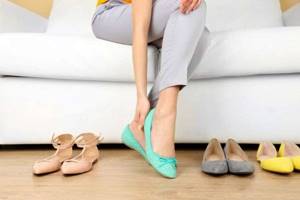
It is important to monitor the condition of your shoes: change the insoles or dry them in a timely manner. Try to buy only leather shoes, cotton or linen socks. In summer, it is advisable to wear sandals or open shoes.
You need to wash your shoes not only on the outside, but also on the inside using disinfectants; if you don’t have allergies, you can use detergents.
When storing, you can put cedar shavings in your shoes. It is recommended to wipe the inside of the shoes with salicylic alcohol.
You should not wear someone else’s shoes or walk barefoot in public places, as you may get a fungal infection. It is advisable, especially in winter, not to wear warm boots indoors. It is necessary to have replaceable shoes and always change your shoes.
To get rid of the problem of hyperhidrosis, you should first of all take care of the skin of your feet, but do not forget about your shoes. It is recommended to have several pairs of shoes, boots or sneakers in order to dry and process them in a timely manner.
Fungal diseases of the feet
Foot or nail fungus is highly contagious, but even when infected, it does not always cause illness. When in contact with a fungal agent, a strong immune system prevents the development of a fungal disease, and if the immune response is weakened, the infection leads to the spread of the fungus and the fight against it can take a long time. Depending on the severity of the pathology and the etiological factor (type of fungus), the following may be prescribed:
- antifungal drugs in tablets (Ketoconazole, Intraconazole, Fluconazole);
- antifungal creams (Nizoral, Zalain);
- antifungal sprays (Terbix, Lamisil);
- antifungal varnishes (Batrafen, Demicten, Lotseril).
Following the instructions for using antifungal drugs for the feet, careful hygiene of the skin of the feet, disinfection of linen and shoes will help get rid of the fungus, and therefore the unpleasant odor.
What is hyperhidrosis
Increased sweating is called hyperhidrosis. Sweat is produced most intensely when a person is nervous. This manifests itself in emotional disorders in the form of fear or tension; at this moment, sweat is secreted most intensely in all areas where there are sweat glands.
People with weak immune systems and insufficient physical fitness, and those with excess body weight are especially susceptible to it . Their body is forced to work harder, and all metabolic processes are disrupted. To prevent overheating, the body secretes sweat.
Personal hygiene rules
This is something without which no remedy against foot odor can work fully. Sometimes strict hygiene is enough to combat an annoying odor:
- Wash your feet daily, morning and evening.
- If tolerated well, wash your feet with cold water after washing.
- Periodically cleansing the skin of dead cells (using peelings, scrubs).
- Thoroughly dry the skin of the feet, especially between the toes.
- Wearing high-quality socks and tights (made from natural materials or with a small admixture of synthetics).
- Wearing high-quality shoes made from natural materials.
- Wearing appropriate shoes.
- Regular change of socks.
- Constant care for shoes - treating the inner surface of shoes with antiseptic solutions (potassium permanganate, hydrogen peroxide).
Foot deodorants
This is a tool that is accessible to everyone and can be used every day. According to the mechanism of action, deodorants are divided into: antiperspirants, fragrances (masking the odor), normalizing sweating and medicinal. They come in the form of cream, gel, spray or talc.
- Antiperspirants block sweat ducts: FRESHFOOT, KLIMA SUREFOOT SPRAY, Odour Control Neutra-Activ. They cannot be used around the clock; the skin of the feet must also breathe.
- Deodorants that normalize sweating: Vichy 7 days, Deo control. They do not block the sweat glands, but keep sweating to a minimum.
- Therapeutic deodorants prevent bacteria from multiplying, eliminating the root cause of the odor: Gevol honey. However, they should not be used constantly - as is known, bacteria gradually get used to substances that are harmful to them, i.e. become stable.
Deodorants are applied to clean and dry skin of the feet; it is necessary to wait for the deodorant to be absorbed or dry, and only then put on socks or shoes. At the end of the day, the product should be washed off.
Medicines for sweaty feet
If cosmetics and folk remedies turned out to be ineffective and did not help you cope with the problem of excessive sweating and pungent odor, then you should use pharmaceutical drugs. The range of such means is truly huge, but not every one of them has been able to prove its effectiveness in practice.
Drisol is considered one of the effective medicines. Its main task is to block the sweat glands on the legs. However, you should not use this remedy too often, as this may cause problems with swelling of your legs. In addition, Drisold often causes allergic reactions, so initially it is worth applying a small amount of the product to a small area of the foot to see if it will cause negative effects for you.
A medicine such as formidron has performed quite well. It can be used for a long period. However, remember that this drug often causes redness on the skin of the legs. If you experience such a reaction, then you should stop using the product.
Borozin will not only help eliminate odor, but also cure fungal diseases in the initial stages. Therefore, if cracks form on your legs, you should immediately go to the nearest pharmacy.
One of the most common remedies is Teimur paste. This drug is used to combat sweaty feet. However, pay attention to how your feet react. If redness appears on the skin, then you should stop the treatment course.

Creams, lotions for feet
There are many foot creams used to prevent excessive sweating. Creams are good because they can be used constantly, even throughout your life, the main thing is to choose your ideal cream. In addition to its main action, the cream cares for the skin of the feet, softens and nourishes it. The most popular and effective foot creams:
Dry-Dry
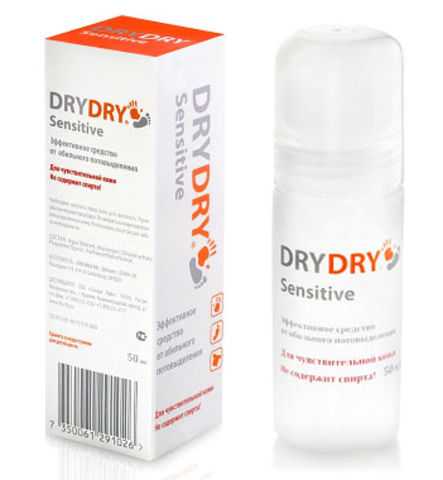
This is a unique product from the Swedish company Scandi Line, which is a transparent liquid. Contains aluminum chloride hydrate and denatured alcohol. The active substances create a protein-aluminum plug, which does not disrupt the function of the sweat glands, but leads to the fact that sweat is released in a normal volume and more easily from other places and is excreted by the kidneys.
When used correctly, protection against sweat and odor lasts for 3-5 days. The product is applied to clean and dry skin an hour before bedtime with gentle movements and dries naturally for several minutes. You can no longer wash yourself on this day, but in the morning you can already perform your usual hygiene procedures; the drug will no longer be washed off.
Lavilin
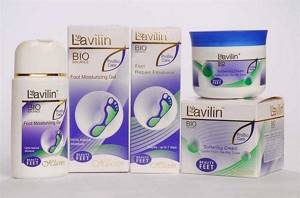
Herbal foot cream from the Israeli manufacturer Hlavin. The cream contains several active substances: talc, zinc oxide, ethylhexylglycerin, potato starch, triethyl citrate, chamomile, arnica, calendula. Protects against sweat and odor for 7 days. The product is odorless. It has a complex effect - it slows down the activity of sweat glands, destroys bacteria and fungus.
Apply a very small amount to clean and dry skin of the feet by rubbing evenly over the entire problem area. You can’t get your feet wet for a while, after which you can wash, play sports, etc. – protection from sweat will be provided. Reapplication is only necessary if the odor of sweat appears.
Galeno Pharm “5 days”
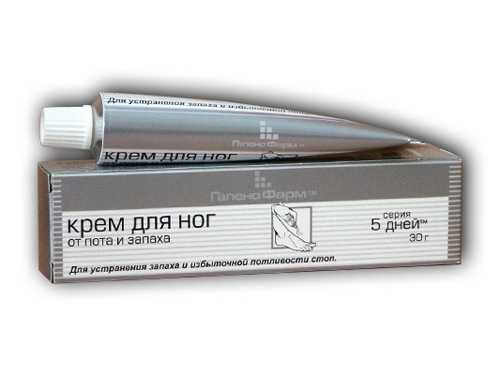
Active ingredients: zinc oxide, which has a drying, disinfectant and astringent effect, cetyl alcohol, which retains moisture in the skin, camphor - an antiseptic and menthol, which gives the skin freshness and cools the feet. Thus, the cream acts comprehensively, reducing sweating activity and destroying pathogenic flora. Apply to dry and clean skin of the feet every day, preferably in the evening before bed. The consistency of the cream is greasy, so you should not create a film, but apply in small quantities so that the cream is absorbed into the skin.
Deodorizing foot cream Deo-control from Kalina
It contains a unique OilCARE complex: shea butter, lavender, cocoa, tea tree and vitamins A, E, B5. Destroys bacteria and creates an invisible protective film on the skin. Apply after a shower to dry skin by rubbing the required amount of cream into the skin of your feet and fingers until completely absorbed. Reapplication is necessary after washing or if a sweat odor appears.
Green Pharmacy deodorizing and antifungal foot cream
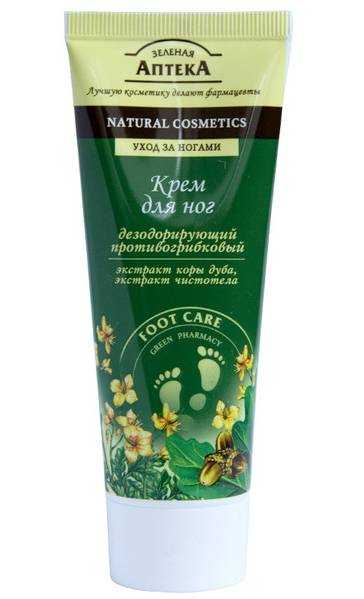
Contains zinc oxide, menthol, camphor and tea tree oil, which give the cream a drying, antifungal and deodorizing effect. Promises five days of sweat protection. Apply until completely absorbed onto dry and clean skin of the feet, especially recommended after visiting a sauna or steam bath.
Pharmacy products
Benzoyl peroxide gel or lotion 5 and 10%
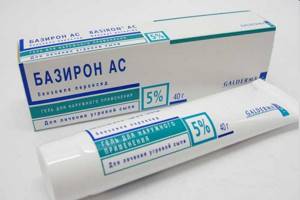
Baziron AS, Oxy Silver - according to the instructions, this drug is intended for the treatment of acne, but it is also successfully used against foot odor. Benzoyl peroxide, the active ingredient of the drug, inhibits the development of anaerobic flora. Apply once a day to dry and clean skin, between the fingers, with light massaging movements until completely absorbed. Can be used for up to 3 months.
Pasta Teymurova
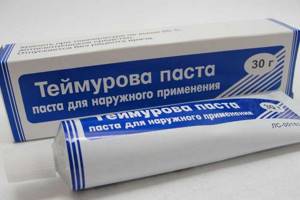
A drug prescribed by doctors for excessive sweating. It has a drying and disinfecting effect due to the content of boric and salicylic acid, talc and zinc oxide. Apply to clean and naturally dried (not with a towel) skin of the feet, between the toes, by rubbing for 1-3 minutes, at night. You can use it continuously for 3-4 days in a row, then take a break. If necessary, treatment is resumed.
Lavender oil
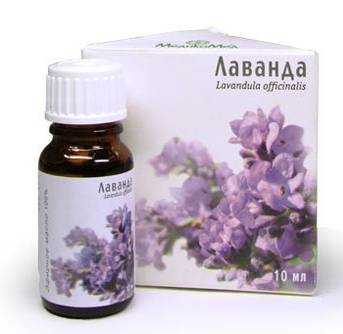
Lavender oil is a natural antiseptic, destroys fungus and perfectly refreshes the skin. You cannot use undiluted oil; it must be added to a foot bath. About 5 ml of lavender oil is added to a bath of water at room temperature. Oil is known to be insoluble in water, so for greater effect it should be diluted in a base liquid, such as milk, and then added to water. The procedure time is 20 minutes. This bath should be done 2-3 times a week at night.
Formidron
Contains formaldehyde, which has an antiseptic and deodorizing effect on the skin. The drug is in the form of a liquid, so you should be careful when dosing and applying. Apply once a day to clean and dry skin, rubbing the solution into problem areas. Long-term use may lead to dry skin.
Burnt alum
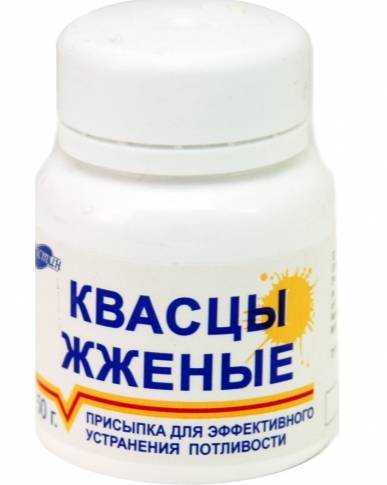
The basis of the drug is natural potassium-aluminum alum, which after certain processing turns into powder. They are excellent sweat adsorbents and immobilize bacteria and fungi. Reduces the activity of sweat glands. They have an anti-inflammatory effect. Use as a powder, applying the powder to clean and dry skin in the morning, and in the evening, wash off the remaining product in the shower.
Boric acid
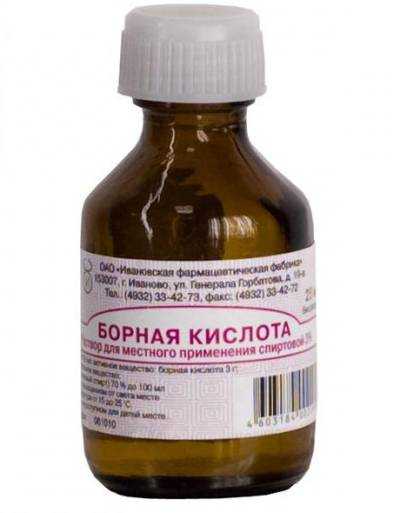
It has antiseptic activity and therefore eliminates the cause of odor. A small amount of boric acid is poured into each sock and distributed over its surface, after which the socks can be put on clean and dry feet. In the evening, feet should be washed thoroughly and socks should be washed. The procedure is repeated for a week, then a break is taken for 5-7 days and the course can be repeated.
Skin of feet
The keratinized areas of dead skin are also an incubator for smelly living creatures. Use pumice stones or files and graters to remove them.
Files are used on dry skin before washing or steaming feet, pumice and graters on steamed skin. Clean rough areas of the foot 1-2 times a week, and you will not only eliminate the breeding ground for bacteria, but also get soft and tender heels and feet.
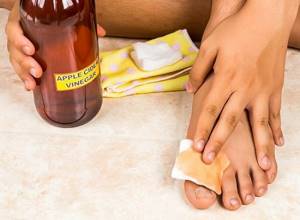
Remember to thoroughly rinse used tools so that they do not become a breeding ground for the living creatures you are fighting.
Traditional ways to combat unpleasant foot odor
- Starch. It will help out in a situation when there is nothing else. Apply as a powder to dry and clean skin of the feet, after which you can put on socks and shoes. It perfectly absorbs excess sweat, binds it and prevents odor from appearing.
- Fresh lemon peels. The essential oils contained in lemon skin perfectly dry and aromatize the skin, and also destroy fungus. Lemon peels must be rubbed in your hands to release the oil, and applied to dry and clean skin of the feet until absorbed.
- Baths with sea salt. Salt dries and deodorizes the skin, and bacteria and fungi are very sensitive to the action of natural salt. Every evening you need to do foot baths with the addition of 2 tbsp. sea salt for 10 minutes. Feet should be dried naturally after the procedure.
- Oak bark. An infusion of oak bark has tanning and drying properties, and narrows the sweat ducts. Use infusion for foot baths: 2 tbsp. oak bark is poured with a liter of boiling water for 20 minutes, then the infusion is added to the foot bath. A 10-minute procedure is enough and should be repeated daily.
- Laundry soap. It has strong antimicrobial properties and reduces sweating. But it can dry out the skin, so you shouldn’t use it for more than 5 days in a row. To achieve the effect, just wash your feet with laundry soap and cool water.
Author:
Sabuk Tatyana Leonidovna hygienist, epidemiologist
What to do if your feet sweat a lot
Hyperhidrosis is a disease in which a person sweats excessively. It is important to eliminate the pathology that caused excessive sweating, as well as use topical foot remedies.
It is recommended to purchase products that contain formaldehyde at the pharmacy. This substance kills microorganisms and helps reduce sweating by controlling the sweat glands.
The following drugs are considered the most effective:
- Formidron. Has a liquid form. Apply to feet for 30 minutes, then rinse without using soapy substances.
- Formagel. Has a deodorant effect. Used as the previous remedy.
- Fernomil. The complex drug affects foot problems such as calluses and warts.
- Malavit. Additionally prescribed for skin pathologies. The cream is applied twice a day.
- Borozin. Gets enough sleep inside for 5 days. The effect lasts for a long time.
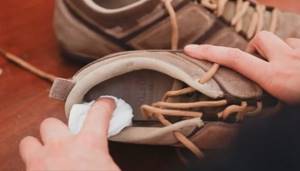
Patients with hyperhidrosis are prescribed iontophoresis. The course is aimed at the impact of current and the penetration of charged ions. Used to reduce sweating in the armpits, palms and other areas. It is prohibited to carry out during pregnancy, heart disease, epilepsy, or in the presence of metal implants.
Traditional medicine offers the following options for getting rid of sweating:
- Foot baths - bay leaves are brewed in boiling water in the proportions of 3 liters of water per 20 pieces.
- With a decoction of oak bark. Take baths daily for 30 minutes.
- Treating feet with lemon juice. Before the procedure, take a bath with antibacterial soap.
- Soda compress. Apply it to your feet for an hour, then wash it off. It is recommended to apply deodorizing cream.
- Wipe with apple cider vinegar daily.
You can also apply Teymurov’s paste, talc, starch, and powder at home.
